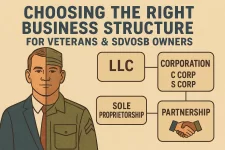 Whether you’re a veteran starting a business or you're pursuing SDVOSB/VOSB certification, choosing the right legal structure is one of the most critical decisions you’ll make. Your business entity affects taxation, ownership control, liability, eligibility for contracts, and long-term scalability.
Whether you’re a veteran starting a business or you're pursuing SDVOSB/VOSB certification, choosing the right legal structure is one of the most critical decisions you’ll make. Your business entity affects taxation, ownership control, liability, eligibility for contracts, and long-term scalability.Let’s break down the most common entity types—and when each one makes the most sense.
 Why This Decision Matters for SDVOSB/VOSB Owners
Why This Decision Matters for SDVOSB/VOSB Owners
If you’re pursuing or already certified as a Service-Disabled Veteran-Owned Small Business (SDVOSB) or Veteran-Owned Small Business (VOSB), your business structure needs to meet certain SBA control and ownership standards. Not choosing the right one could delay or disqualify your certification. Sole Proprietorship (Not Recommended for SDVOSB)
Sole Proprietorship (Not Recommended for SDVOSB)
Overview:
A sole proprietorship is the simplest type of business entity. It’s not a registered business—there’s no legal separation between the business and you personally.Pros:
- Simple and inexpensive to start
- No formal paperwork required
- Full control by one individual
Cons:
- No liability protection
- Difficult to get contracts or business credit
- Doesn’t meet the ownership and control requirements for SDVOSB certification
Best For:
- Solo freelancers with no plans to pursue certification, hire employees, or win government contracts
Avoid this structure if you plan on growing, getting certified, or protecting yourself legally.
 Limited Liability Company (LLC)
Limited Liability Company (LLC)
Overview:
An LLC offers liability protection like a corporation but with simpler tax options and fewer formalities. It’s one of the most popular structures for small businesses, especially veteran-owned ones.Pros:
- Easy to form and manage
- Limited liability for personal assets
- Can be taxed as sole proprietorship, partnership, or S corp
- Qualifies for SDVOSB/VOSB certification (if 51%+ veteran-owned & controlled)
- Flexible ownership structure
Cons:
- Some states charge high annual fees
- Not ideal for outside investors
- Must keep business and personal finances strictly separate
Best For:
- Veterans who want flexibility, low maintenance, and liability protection
- SDVOSB certification applicants
- Small teams or solo founders with no venture capital needs
LLC is ideal for most veteran-owned startups, contractors, and small businesses aiming to qualify for federal and state certifications.
 S Corporation (S Corp)
S Corporation (S Corp)
Overview:
An S Corporation is a tax election made by LLCs or corporations to pass income directly to shareholders, avoiding double taxation.Pros:
- Avoids double taxation (profits pass through to owners)
- Owners can pay themselves a “reasonable salary” + dividends to save on self-employment taxes
- Maintains liability protection
- Accepted for SDVOSB/VOSB certification if veteran-owned
Cons:
- Strict eligibility rules (100 shareholders max, U.S. citizens/residents only)
- Requires payroll setup and formal accounting
- Can’t retain profits in the business like a C Corp can
- More IRS scrutiny on salary vs dividends
Best For:
- SDVOSB LLCs or Corps making $50K+ in profit annually
- Veterans wanting to minimize self-employment taxes
- Companies with a consistent income, looking to scale
An S Corp election is powerful when your profit hits a threshold where tax savings justify the extra compliance.
 C Corporation (C Corp)
C Corporation (C Corp)
Overview:
A C Corporation is a fully separate legal entity, offering the strongest protection and most structured operations. It is the default corporate form and is taxed independently of its owners.Pros:
- Unlimited shareholders and growth potential
- Ideal for raising capital, issuing stock, attracting investors
- Strong liability protection
- Can retain earnings for reinvestment
- Still qualifies for SDVOSB/VOSB if ownership & control standards are met
Cons:
- Double taxation (corporation and owner are taxed separately)
- Complex compliance and IRS filing requirements
- Higher startup and maintenance costs
- Less flexibility than LLC
Best For:
- Veteran-owned businesses planning to scale nationally
- Startups looking for outside investors or equity partners
- Businesses targeting large federal contracts, joint ventures, or GSA schedules
Choose a C Corp if you're thinking big—investment, multiple owners, or growth into the 7–8 figure range.
 Partnerships (General or Limited)
Partnerships (General or Limited)
Overview:
A partnership involves two or more people sharing ownership of a business. There are General Partnerships (GP) and Limited Partnerships (LP).Pros:
- Shared startup costs and responsibilities
- Flexibility in how profits are split
- LPs allow passive investors to limit liability
Cons:
- General partners are fully liable
- Disputes and unclear agreements can cause major issues
- Difficult to certify for SDVOSB/VOSB unless veteran has clear 51% ownership and control
- Rarely the best long-term structure
Best For:
- Two veteran co-founders just starting out
- Short-term joint ventures or teaming agreements
Use partnerships with a solid operating agreement or convert to an LLC or corporation as you grow.
 Choosing the Right Entity Based on Your Goals
Choosing the Right Entity Based on Your Goals
| Situation | Recommended Structure |
|---|---|
| Solo veteran contractor wanting liability protection and SDVOSB eligibility | LLC |
| Profitable veteran-owned LLC trying to lower taxes | LLC taxed as S Corp |
| Two veteran co-owners working together | Multi-member LLC or S Corp |
| Veteran-owned tech company seeking outside investment | C Corp |
| SDVOSB looking to bid larger contracts and hire employees | S Corp or C Corp |
| Passive income business (real estate, holding company) | LLC or LP |
 SDVOSB Certification Compliance Reminder
SDVOSB Certification Compliance Reminder
No matter which structure you choose:- Veteran(s) must own at least 51% of the business
- Veteran(s) must control day-to-day operations and long-term decisions
- This must be reflected in operating agreements, bylaws, and voting rights
 Final Thoughts: Build With the End in Mind
Final Thoughts: Build With the End in Mind
Choosing the right entity sets the foundation for everything—contracting, certification, taxes, funding, and scale. Don’t just pick what’s easiest today. Think like an operator. Where are you going in 2–5 years?Need help deciding? Post your situation in the forum and let the community weigh in. We're here to help you build the right structure, the first time.
